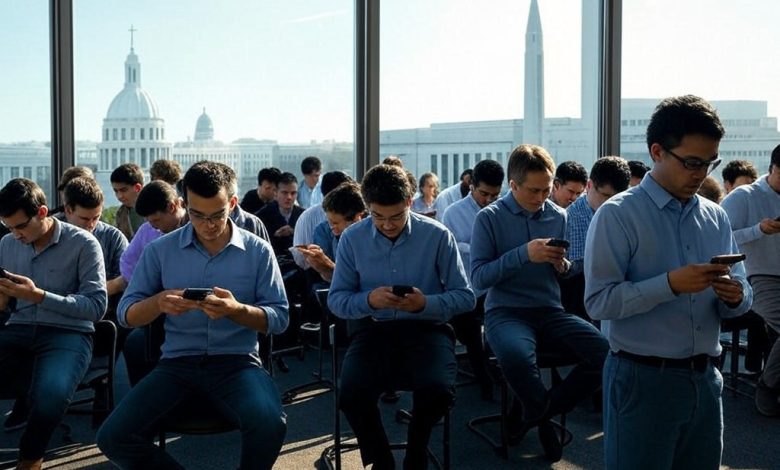
It’s hard to imagine congressional staffers asking for a 32-hour work week with a straight face. But then again, these are the same people who treat a three-hour lunch as “team-building.”
While the average American juggles multiple jobs just to scrape by, these staffers want less time in their cushy offices, arguing it will somehow increase productivity. Sure, and the DMV is a paragon of efficiency.
Let’s not sugarcoat it: If you tally their current output, a 32-hour work week would effectively double their hours. These are the folks who redefine “40 hours” as “20 hours of scrolling social media, 10 hours of networking, and 10 minutes of pretending to read your emails.” The audacity to make this demand in a post-pandemic America, where the private sector—still licking its wounds—is struggling to stay afloat, is breathtaking.
And let’s not forget: there’s a new sheriff in town. Donald J. Trump—king of efficiency and the guy who brought on Elon Musk, the human productivity machine who casually flipped the bird at work-from-home fanatics. Now these staffers think they can waltz into MAGA territory with their “more sustainable workweek” shtick? That’s like asking Gordon Ramsay if you can nuke a Lean Cuisine in his kitchen.
Their letter reads like a parody:
“By adopting a 32-hour workweek for staff on a rotating basis, you can accomplish these goals while retaining the productivity and quality of work you expect and deserve from your team.”
Translation? We’ll totally work hard for those 32 hours, promise! Pinky swear.
They went on to claim that this magical schedule would “improve worker satisfaction” and “model a more sustainable approach to work.” What it actually models is how to run an office like a Starbucks where half the staff is on their fifth break.
But here’s where it gets interesting: This isn’t just about hours—it’s about attitude. We’re dealing with a generation of staffers who’ve grown up believing that “showing up” deserves a gold star. Participation trophies in childhood have turned into entitlement complexes in adulthood. The idea of grinding it out, paying dues, or even working past 5:00 PM is foreign to them. After all, why hustle when you can craft a LinkedIn post about “work-life balance” and call it a day?
Even Democrats weren’t buying it. The backlash was so brutal, the Congressional Progressive Staff Association withdrew their request faster than AOC backpedaling on her Tesla truck purchase. They issued a statement trying to save face, saying they “remain dedicated to serving the American people no matter how many hours it takes to get the job done.” Sure. Just as long as “how many hours it takes” doesn’t exceed 32.
And here’s where it gets rich:
“We have legitimate grievances, i.e. well-known, longstanding workplace issues that deserve Congress’s immediate attention.”
Grievances? You mean the kind of grievances most Americans solve by sucking it up and getting back to work?
Instead of addressing their supposed “toxic work environments,” they’re essentially asking for more time to sip oat milk lattes and perfect their TikTok dance routines. The private sector—the backbone of America’s economy—has been forced to adapt, innovate, and push through unprecedented challenges. Meanwhile, these staffers are brainstorming ways to work less while demanding the same pay. It’s like watching a toddler negotiate bedtime.
Let’s not pretend this is about productivity. It’s about entitlement. These are the same staffers who’ve watched their bosses rake in millions through insider trading, fraudulent book deals, and “influence peddling” gigs. Why shouldn’t they get a slice of the pie? They see Congress as a giant ATM, where the only PIN code you need spells out “victim narrative”.
If they’re tired of getting ignored, try a tactic that works in DC—cry “sexual harassment,” then stand in line for your settlement check. After all, this is the swamp. If you’re not grifting, you’re not trying hard enough.
The private sector has caught on to the public sector’s game.
We’ve watched Congress fatten its pockets while passing bills no one reads. So when their staffers demand a shorter workweek, the reaction from the average American is simple: Cry me a river.
In their damage-control attempt, the group tried to assure everyone that they have “always been committed to serving the American people.” But let’s face it: if that commitment doesn’t fit into their 32-hour dream week, it’s not happening. And for all their talk about improving workplace culture, they conveniently forget that the American taxpayer—their ultimate boss—works far longer hours for far less money.
At the end of the day, the Congressional Progressive Staff Association’s proposal is a symptom of a larger disease: a culture that rewards complaining over competing, demands perks without performance, and prioritizes self-care over self-discipline. It’s not just a bad look for them; it’s a slap in the face to every hardworking American who doesn’t have the luxury of lobbying for a four-day workweek.
So here’s my advice to these staffers: if the workload is too much, there’s an easy solution. Step aside and make room for someone who’s actually willing to put in the effort. Until then, spare us the crocodile tears. The rest of us are busy working 40, 50, or even 60 hours a week to keep this country running.



